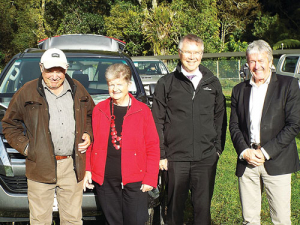Damien O’Connor: NZ united on global trade
When it comes to international trade, politicians from all sides of the aisle are united, says Labour's trade spokesman Damien O'Connor.
 Environment Minister David Parker and Agriculture Minister Damien O’Connor with Cambridge farmers Bill and Sue Garland.
Environment Minister David Parker and Agriculture Minister Damien O’Connor with Cambridge farmers Bill and Sue Garland.
The double-D’S were front and centre at Karapiro, Waikato, recently to promote a voluntary water quality initiative.
David Parker and Damien O’Connor, ministers for the environment and agriculture, respectively, joined industry leaders to endorse the Good Farming Practice-Action Plan for Water Quality 2018.
The plan was developed largely from principles set out in the 2015 Industry-Agreed Management Practices first applied by Environment Canterbury.
The voluntary initiative is led by Federated Farmers, Beef + Lamb NZ, Dairy NZ, Horticulture NZ, Irrigation NZ and people from regional councils and regulatory authorities.
The chief aim is to help make rivers swimmable and to improve the ecology of waterways, so the plan advocates good farming practices -- assessing individual and regional catchments, measuring and showing improvements and telling the public about progress.
At grassroots level this will see workable plans being drawn up to identify physical and topographical constraints, and identify land where cropping should cease because of erosion risks. The plan includes keeping accurate records of inputs and outputs, and managing run-off, sediments and nutrients entering waterways.
Environment Minister David Parker applauded the voluntary nature of the plan and conceded that regulation “might not be the b-all and end-all”. But he said rules and regulations would be part of the solution, as would better education and perhaps “pricing” to influence behaviour.
Parker’s former flatmate Minister Damien O’Connor noted “the need for guidelines in tune with the environment, and for a part of the social licence that allows landowners to operate”.
NZ agriculture and horticulture needs to be the best producer in the world, he said, with their output “food for people who care, produced by farmers and growers who care”.
The plan now is to spend the next two years enlisting farms and local and regional authorities in a campaign going through to 2030.
The World Wide Sires National All Day Breeds Best Youth Camp Best All Rounder plaudit has become family affair, with 2026 Paramount Cup winner Holly Williams following in her sister Zara's footsteps.
DairyNZ is giving New Zealand farmers a unique opportunity to gain hands-on governance and leadership experience within the dairy sector.
Herd improvement company LIC has posted a 5.2% lift in half-year revenue, thanks to increasing demand for genetics.
According to the latest Fresh Produce Trend Report from United Fresh, 2026 will be a year where fruit and vegetables are shaped by cost pressures, rapid digital adoption, and a renewed focus on wellbeing at home.
The Roar is a highlight of the game hunting calendar in New Zealand, with thousands of hunters set to head for the hills to hunt male stags during March and April.
OPINION: The past few weeks have been tough on farms across the North Island: floods and storms have caused damage and disruption to families and businesses.
OPINION: Fonterra may be on the verge of selling its consumer business in New Zealand, but the co-operative is not…
OPINION: What does the birth rate in China have to do with stock trading? Just ask a2 Milk Company.